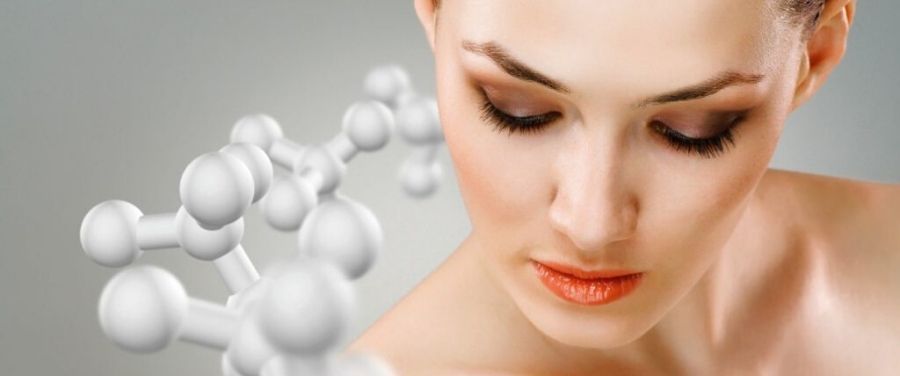OVERVIEW:
Collagen is the most abundant protein in the body. It’s in your bones, muscles, ligaments, tendons, skin, organs, blood vessels, intestinal lining and other connective tissues. The most important task of collagen protein is to act as a “glue” holding the body together.
“Endogenous collagen” is a natural collagen, which is formed in the body on its own. Endogenous collagen has many important functions.
“Exogenous collagen” is a collagen composed of external factors. It is taken from external sources and complementary medicines. It is used for medical and cosmetic (cosmetics) purposes. Exogenous collagen is also used to keep tissues healthy.
WHAT IS COLLAGEN?
Collagen is a solid, insoluble and fibrous protein. It is one-third of the amount of protein in the body.

Most collagen molecules combine with each other to form long and thin fibers, called “fibril”. These fibrils are tied together so that they reinforce each other and give strength and elasticity to the skin.
COLLAGEN STRUCTURE:
Collagen is released from many cells, but is secreted primarily from cells of connective tissue.
In the middle layer of the skin (called “dermis”), collagen forms a fibrous network of cells with the help of fibers, known as “fibroblast”. It works by removing the dead cells of the skin and creating new cells.
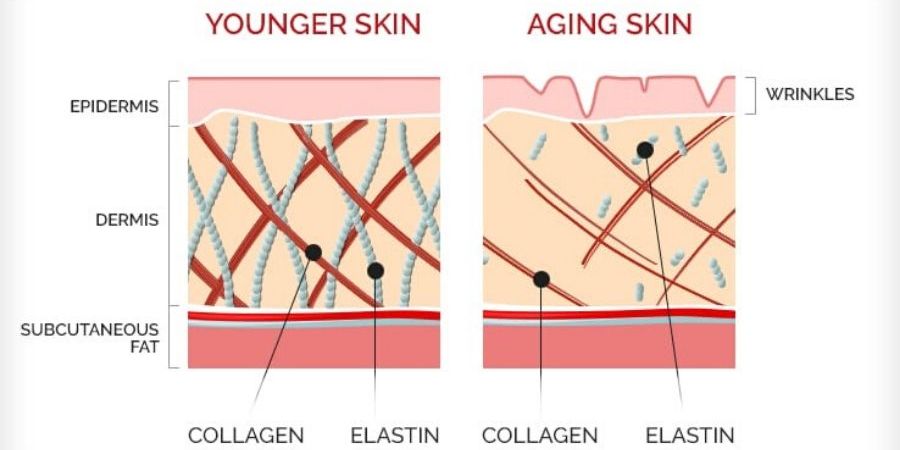
In addition, some collagen acts as a protective shield to protect other fragile organs such as the kidney.
With the age, there is a lack of collagen in the body, due to which skin related problems may start. As a quote, wrinkles start appearing on the face. And especially in women, It seems to be a lack of collagen after menopause. And after the age of 60, it is very common for collagen to decline.
WHAT ARE THE DIFFERENT TYPES OF COLLAGEN?
There are about 16 different types of collagen, but about 80 to 90% of the amount of collagen in the body is only five types of collagen. These different types of collagen have different textures and functions. They are —
- Bone, organs, skin, tendon, vascular (type I makes up over 90% of body’s total collagen)
- Cartilage (flexible tissue found in the larynx and parts of the respiratory tract, joints and ear)
- Reticular fibers
- Basal lamina (cellular entanglement which supports the epithelium, one of the four types of animal tissue)
- Cellular surfaces, hair follicles and placenta
WHAT IS COLLAGEN MADE OF?
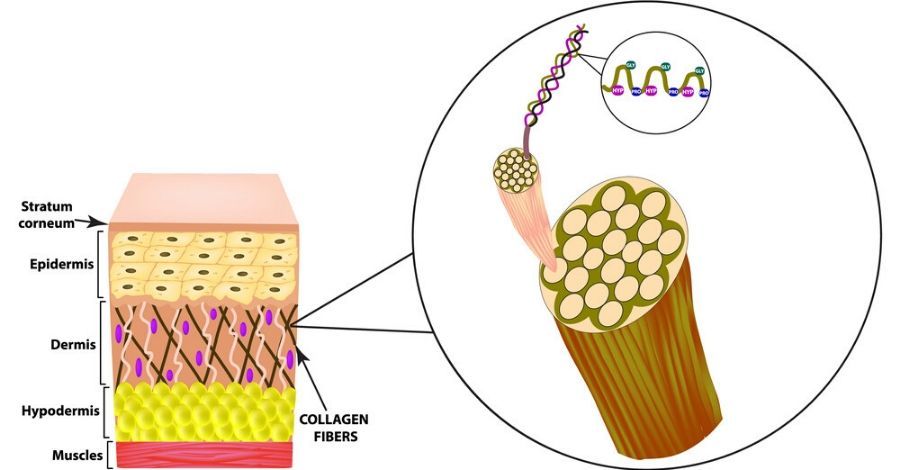
According to Medical News, “collagen is a type of protein made from amino acids, specifically proline, glycine, hydroxyproline, and arginine”.
According to Live Kindly, “collagen peptide supplements are typically derived from bovine connective tissue or fish, from marine collagen”.
WHAT ARE THE SYMPTOMS OF COLLAGEN DEFICIENCY?
Some of the main sign and symptoms of collagen deficiency are —
- Hollowing of eyes and face
- Joint pain
- Leaky gut
- Loss of mobility
- Muscle aches
- Problems with blood flow
- Cellulite
- Wrinkling
WHAT ARE THE BENEFITS OF COLLAGEN?
Now you may ask that — what does collagen do? There’re a wide range of functions of collagen; including —
1. Collagen for Skin:
The most important advantage of collagen is that it is useful for making the skin shiny and healthy. This essential protein provides elasticity to your skin, making you appear young and healthy.
But as you age, the level of collagen starts to decrease, due to which your skin starts getting dry, loose and wrinkled.
A study was carried out in 2014 including 69 women aged 35 to 55. In this study 46 women were given a collagen supplement while the remaining women were given placebo. Improvement in skin elasticity of women taking collagen was observed after four weeks. In a similar study, with the help of collagen, the wrinkles of women were reduced within 8 weeks.
2. Collagen for Hair:
Collagen helps your hair to grow and regrow. It has antioxidant properties, which reduce the production of free radicals in the body which cause hair loss. But by having sufficient amount of collagen, the hair follicles are strengthened and help the hair grow.
Taking collagen makes your hair thicker, stronger and healthier.
3. Collagen for Joint Pain:
With aging, the cartilage (strong and flexible tissue connecting the bones) on the joints of bones starts to decrease, causing you to feel joint pain and stiffness. Collagen can help to reduce joint pain and symptoms of arthritis.
Some people involved in one study were given a supplement of type-2 collagen made from chicken’s neck for 90 days. After few days, a 40 percent decrease in the symptoms of osteoarthritis was observed in these people, while the severity of other symptoms also decreased to about 33 percent.
Another study conducted in 1993 with this same collagen supplement found a decrease in inflammation and joint pain in people with rheumatoid arthritis.
4. Collagen for Muscles:
Collagen is a major organ of muscle tissue, thus it is effective in building muscle mass. It also gives you energy during collagen workout.
Not much research has been done on collagen and excise, but in a study in 2015 gave collagen supplements to men with sarcopenia (a decreased muscle mass due to aging). After 12 weeks, these people showed reduced fat and increased muscle strength compared to others.
5. Collagen for Digestion
Collagen strengthens the lining providing protective tissue and protection to the digestive system. This is very important, because many kinds of elements can reach your bloodstream due to obstruction of the intestinal process and it can also cause inflammation.
A study conducted in 2003 took about 170 people with inflammatory bowel disease and found that most people had significantly lower collagen levels. This showed that increasing the amount of collagen helps to form the layer of tissues of the gastrointestinal tract and make your intestines healthy.
However, there has been little research on the effects of collagen supplementation on the digestive system.
WHAT ARE THE BEST COLLAGEN-BOOSTING FOODS?
It is a general question — How to naturally boost collagen levels in the body?
Well. You can increase the level of collagen by including certain foods into your diet. Here, we are going to discuss some of the best collagen rich foods to boost collagen levels; including —
1. Citrus Fruits:

Vitamin C provides many benefits to your body, as well as it plays an important role in increasing collagen and helps to reduce free radicals. Vitamin C is an antioxidant that increases synthesis of collagen. You should also include vitamin C-rich fruits in your diet, such as lemons, and oranges.
2. Fish:
Fish contains a lot of omega-3 fatty acids, which are necessary for the communication of your cells. Healthy cells are very important for the texture of your skin.
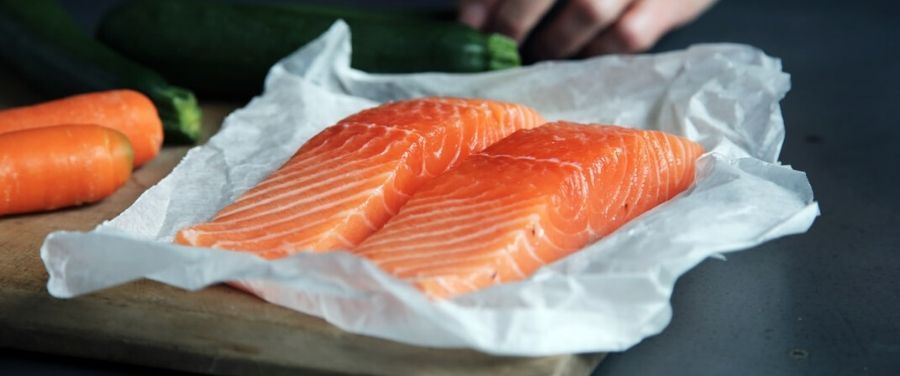
3. Green Vegetables:
Vegetables such as broccoli and spinach effectively increase collagen levels. It also helps to prevent collagen damage due to smoke, dust, cigarette smoke and excessive sun exposure.

4. Red Colored Vegetables:
Research has shown that some red colored vegetables contain an antioxidant called lycopene, which helps to increase collagen. You can get this antioxidant from beets, peppers and tomatoes. Lycopene not only works to increase collagen, but also protects your skin from sun rays.

5. Orange Colored Vegetables:
You can fulfill the requirement of collagen by orange vegetables like sweet potatoes and carrots. Such vegetables contain vitamin A, which plays a major role in building cells and keeping skin healthy. Orange fruits such as mangoes and apricots are also the main sources of beta-carotene, which is released into the body and converted into vitamin A.

6. Berries:
Berries are skin healthy fruits. Black mulberry, cherries, berries are helpful in the formation of collagen in the body. They are rich in essential antioxidants for the skin.
7. Garlic and Olive:
Sulfur has been used for centuries for skin diseases and dandruff. In addition to garlic, green and black olives are also rich in high amounts of sulfur, which is considered important in adding and increasing the collagen in the skin.
8. Eggs:

Healthy protein is necessary for the body and egg is considered to be its main source. Eggs replenish amino acids called lysine and proline required in collagen production.
9. Pineapples:
Pineapple and its juice help in synthesizing collagen in the body. Eating this makes your skin healthier and shinier.

10. Nuts and Seeds:
Nuts and seeds are a rich source of healthy fat and plant—based protein. Some of them also contain many nutrients that help to boost collagen production, like zinc and copper. For this, include pumpkin seeds, chia seeds, sunflower seeds, peanuts, cashews and pistachios.
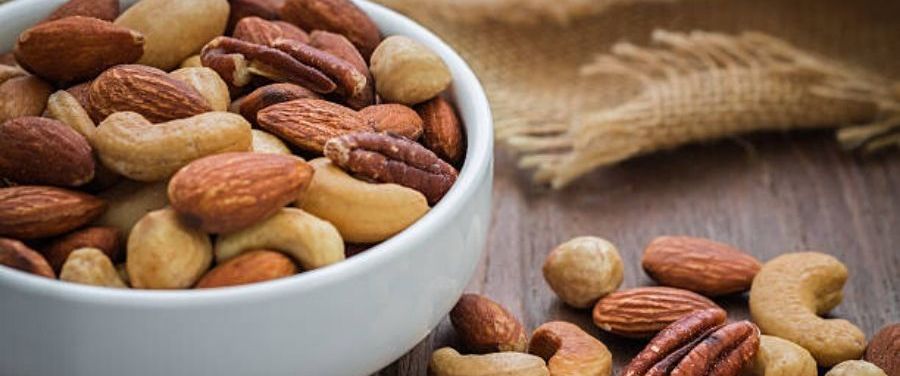
WHAT ARE THE SIDE EFFECTS OF COLLAGEN?
Generally, it is safe to take collagen supplements under healthcare professional’s guidance.
In general, the side effects of collagen supplements are mild; including —
- Rashes
- Diarrhea
- Heaviness in the stomach
DOES COLLAGEN ACTUALLY WORK?
Many studies reveal that taking collagen supplements for a few months can improve your skin elasticity such as wrinkles, roughness as well as signs of aging.
Others studies have shown that collagen can boost the density in bones weakened with age and can improve back, joint and knee pain. But many of these researches are small and funded by the organizations that make the product, increasing the opportunity for bias in the results.
According to a literature review (2019) in the Journal of Drugs in Dermatology, “There is a possibility that some of these benefits are attainable”.
The review reveals some data from double-blind placebo controlled studies to support that collagen could increase overall hydration, collagen density and skin elasticity. But a lot more evidence is needed.
IS IT SAFE TO TAKE COLLAGEN SUPPLEMENTS?
There are many collagen pills and supplements available online. But, many people have a question in their minds that — Is taking collagen safe?
If you’re consuming a healthy diet and feeding your body with all needed nutrients to make collagen, you probably don’t need a supplement. But there’s nothing wrong with taking one.
Collagen peptide or hydrolyzed collagen powder usually has no flavor and easily dissolves in soups, beverages, smoothies, and sauces. As for skin cream with synthetic collagen, it may work. It will add extra protective layer to your skin, reduces water loss and acts as a barrier from external influences. But, skin cream usage is probably not as effective as consuming healthy diet and protecting your skin from sun exposure and sunburns.
TAKE AWAY
Collagen plays a vital role in supporting skin, hair, joints, and digestive health. It helps to increase muscle growth and muscle mass. Some of the best collagen foods are eggs, pineapple, tomatoes, carrot, citrus fruits, green or leafy vegetables, and berries. You can also take collagen supplements. But, it is advisable to take these supplements under your doctor’s guidance.
REFERENCES:
- Anna Czajka et. al. Daily oral supplementation with collagen peptides combined with vitamins and other bioactive compounds improves skin elasticity and has a beneficial effect on joint and general wellbeing. Nutrition Research, September 2018; 57: 97-108.
- Wich Sangsuwan & Pravit Asawanonda. Four-weeks daily intake of oral collagen hydrolysate results in improved skin elasticity, especially in sun-exposed areas: a randomized, double-blind, placebo-controlled trial. Journal of Dermatological Treatment, February 2020; SP 1 EP 19.
- Responte D.J., Natoli R.M., Athanasiou K.A. Collagens of articular cartilage: structure, function, and importance in tissue engineering. Critical Reviews in Biomedical Engineering, 2007; 35(5): 363-411. PMID: 19392643
- Viguet-Carrin S., Garnero P. and Delmas P.D. The role of collagen in bone strength. Osteoporosis International, 9 December 2005; 17: 319–336.
- 8 Signs You Have A Collagen Deficiency, Power of Positivity
- Inoue N, Sugihara F, Wang X. Ingestion of bioactive collagen hydrolysates enhance facial skin moisture and elasticity and reduce facial ageing signs in a randomised double-blind placebo-controlled clinical study; PMID: 26840887
- Asserin J, Lati E, Shioya T, Prawitt J. The effect of oral collagen peptide supplementation on skin moisture and the dermal collagen network: evidence from an ex vivo model and randomized, placebo-controlled clinical trials. PMID: 26362110
- Figueres Juher T, Basés Pérez E. An overview of the beneficial effects of hydrolysed collagen intake on joint and bone health and on skin ageing. PMID: 26267777
- James P. Lugo, Zainulabedin M. Saiyed & Nancy E; Nutrition Journal, Lane Efficacy and tolerability of an undenatured type II collagen supplement in modulating knee osteoarthritis symptoms: a multicenter randomized, double-blind, placebo-controlled study
